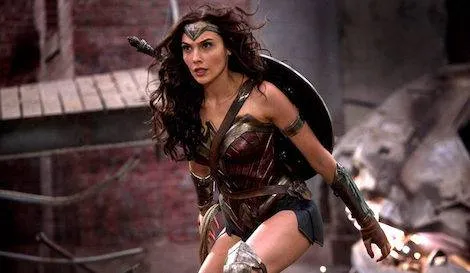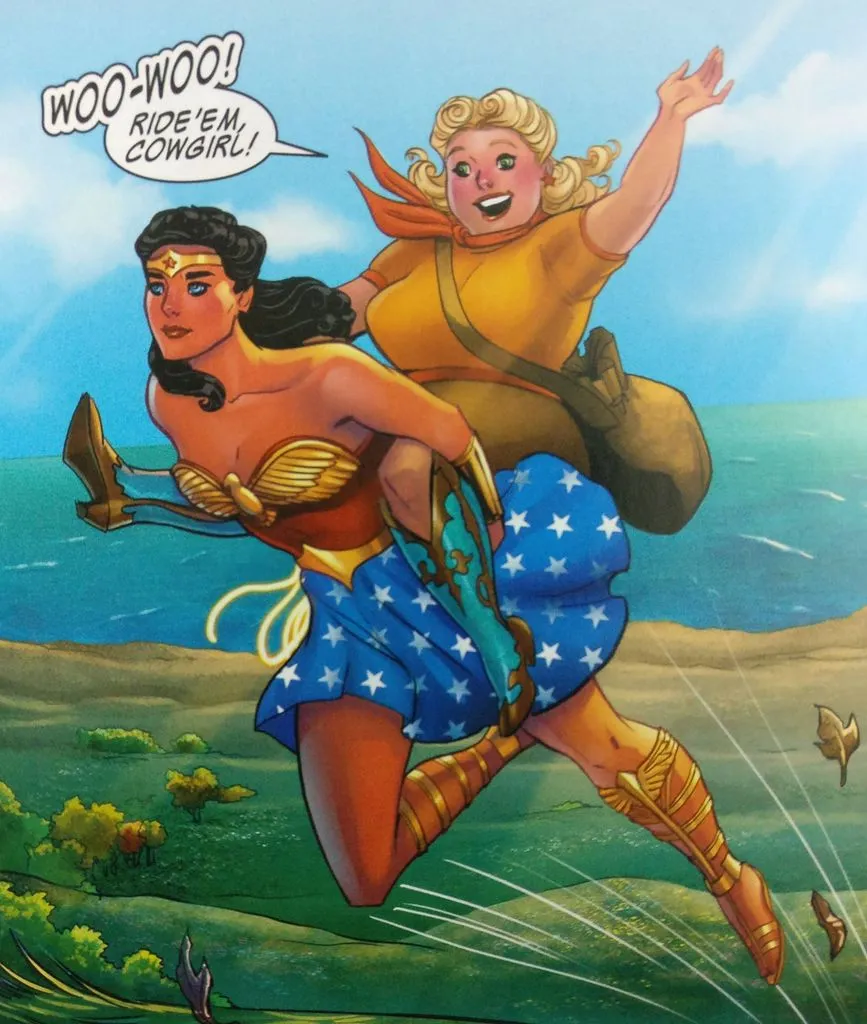
Where We Can Go After Wonder Woman
This content contains affiliate links. When you buy through these links, we may earn an affiliate commission.
The Wonder Woman movie, as much as it made me well up and feel all the feels about women and physical strength, was a small victory. If this means we get another female superhero movie in 2018, it has done its job. If this means more female directors get their shot at making superhero movies, it has done its job. If this week ends with one less man undermining me for being a woman because the movie in some small way, made them see women as stronger, it has done its job.
While the movie, hopefully, does its job as a small victory, I’d like to take account of the many ways that future attempts like these could do more.
1. Holy mansplaining, Steve!
Here is the first big issue I had with the movie, which seriously interrupted my viewing pleasure: Steve Trevor mansplaining everything, talking over Diana, and underestimating her. I know, I know, she needed someone to introduce her to the outside world, but her inability to get through a revolving door was a bit too much, considering that I wasn’t expecting the heroine of a female superhero movie to also be a damsel in distress. Steve telling Diana how to dress more conservatively, and not stand out, was also an extremely sore point for me. The Legend of Wonder Woman works much better to this purpose, wherein Etta Candy is at Diana’s side to help her navigate.
 2. More women outside of Themyscira:
Taking off from ‘more Etta, please,’ there seriously needed to be more women out there, beside Etta and Doctor Poison. Again, I’m well aware that the setting was not very conducive to this, with the war and the need to show that decisions were essentially being made by men during the World War, but do not give me ‘historically accurate’ as a reason. It’s a superhero movie, and a cast and script can be altered in many ways. I see so many reviews saying that the movie built a ‘world of women’, which, sure it did, but how much screen time did that get?
3. More racial diversity:
There was so much more scope for more PoC to be cast in the movie, my biggest complaint being all the glory going to Robin Wright as Antiope, instead of the presence of Philippus/Alcippe, a black Amazonian, as Diana’s mentor.
2. More women outside of Themyscira:
Taking off from ‘more Etta, please,’ there seriously needed to be more women out there, beside Etta and Doctor Poison. Again, I’m well aware that the setting was not very conducive to this, with the war and the need to show that decisions were essentially being made by men during the World War, but do not give me ‘historically accurate’ as a reason. It’s a superhero movie, and a cast and script can be altered in many ways. I see so many reviews saying that the movie built a ‘world of women’, which, sure it did, but how much screen time did that get?
3. More racial diversity:
There was so much more scope for more PoC to be cast in the movie, my biggest complaint being all the glory going to Robin Wright as Antiope, instead of the presence of Philippus/Alcippe, a black Amazonian, as Diana’s mentor.
 4. Some LGBTQ representation:
Wonder Woman is canonically bisexual, so don’t @ me, but I would have loved to replace Chris Pine entirely, and have Diana fall in love with a woman as part of her origin story because I think Steve Trevor got too much screen time and hero-treatment, and I would have loved for that to have gone to another woman. My feelings for Chris Pine have been accurately summarized in the form of this tweet:
4. Some LGBTQ representation:
Wonder Woman is canonically bisexual, so don’t @ me, but I would have loved to replace Chris Pine entirely, and have Diana fall in love with a woman as part of her origin story because I think Steve Trevor got too much screen time and hero-treatment, and I would have loved for that to have gone to another woman. My feelings for Chris Pine have been accurately summarized in the form of this tweet:

Yes, Please
 4. Some LGBTQ representation:
Wonder Woman is canonically bisexual, so don’t @ me, but I would have loved to replace Chris Pine entirely, and have Diana fall in love with a woman as part of her origin story because I think Steve Trevor got too much screen time and hero-treatment, and I would have loved for that to have gone to another woman. My feelings for Chris Pine have been accurately summarized in the form of this tweet:
4. Some LGBTQ representation:
Wonder Woman is canonically bisexual, so don’t @ me, but I would have loved to replace Chris Pine entirely, and have Diana fall in love with a woman as part of her origin story because I think Steve Trevor got too much screen time and hero-treatment, and I would have loved for that to have gone to another woman. My feelings for Chris Pine have been accurately summarized in the form of this tweet:
As a postscript, I would like to clarify that this is not to say that any female superhero movie must be perfect, or else it loses its merit. I mean, people walked out fuming from Batman vs Superman, but they’ll all still watch any Batman/Superman movie to come, right? So I’ll still enthusiastically watch any movie where a female superhero kicks some ass and saves the world. I could also have written a post about how the display of a woman army defending themselves successfully made me sob, and how watching Diana overpower men was overwhelmingly cathartic for me. The last I remember feeling this way was with Marvel’s Jessica Jones, and in that sense, the movie was affirming and lovely in many ways. In an interview, Gal Gadot says that “the way Patty (Jenkins) has captured the Wonder Woman character, she is very relatable to everyone. Boy, girl, man, woman — everyone can relate to her.” Excuse me while I sulk about the fact that male superhero movies are hardly ever created with that in mind. This is just to say that we have some way to go.Chris Pine is great and all, but I love a Wonder Woman who has no time for Steve pic.twitter.com/86EG87Fds1
— Superdames Comics (@superdames) June 4, 2017